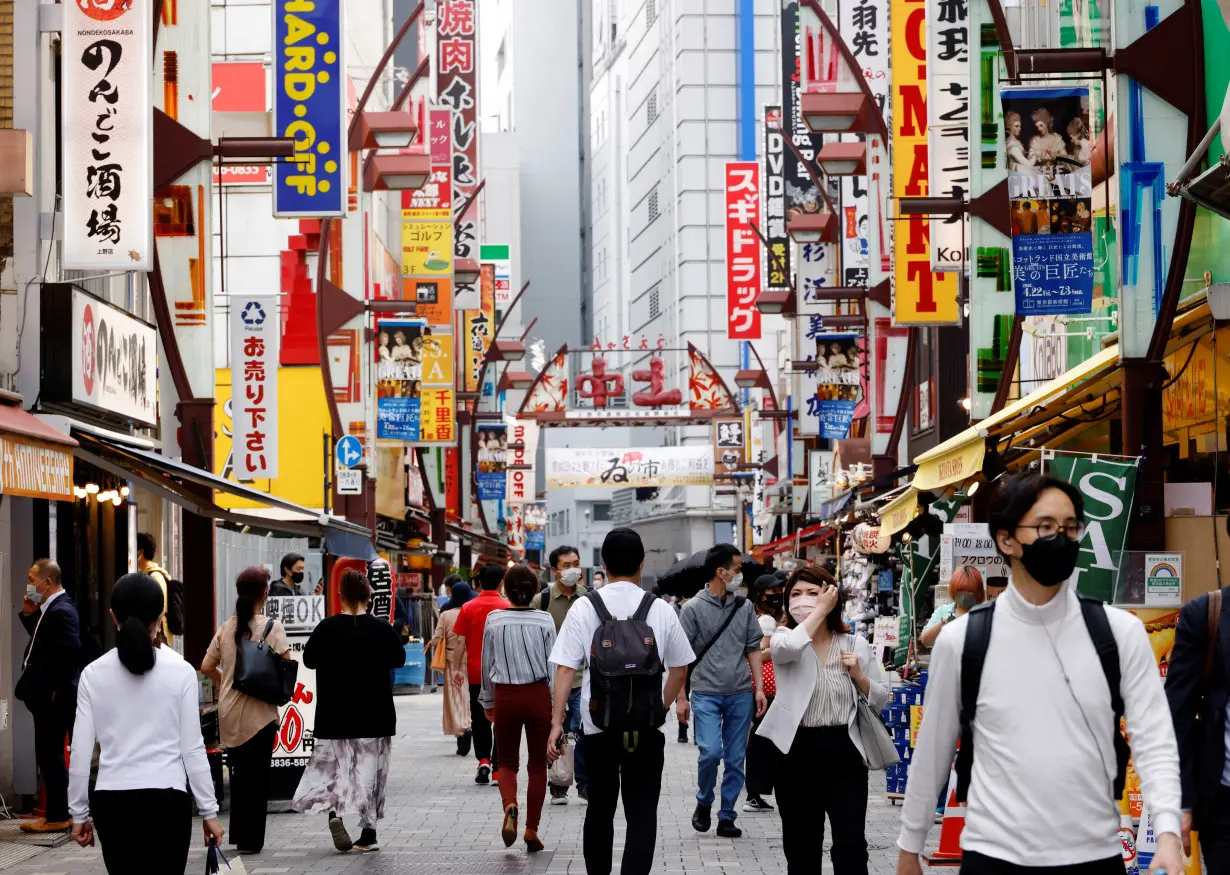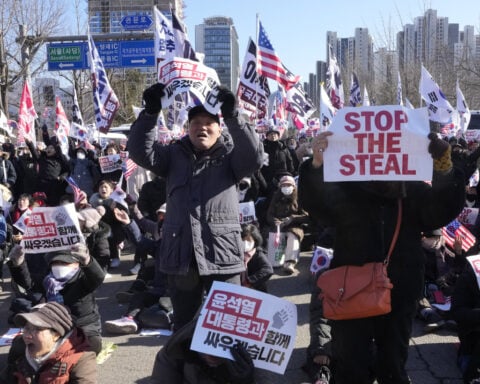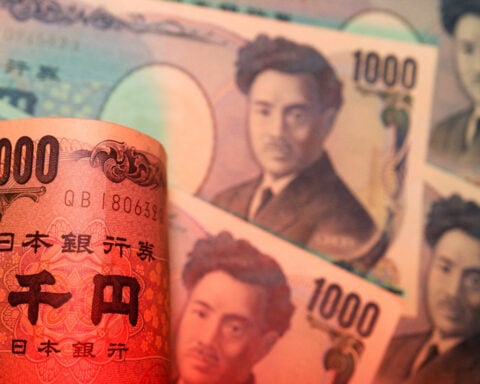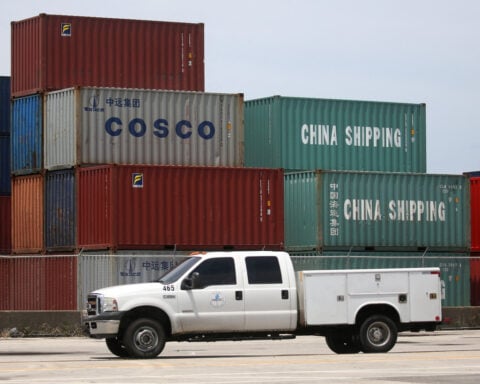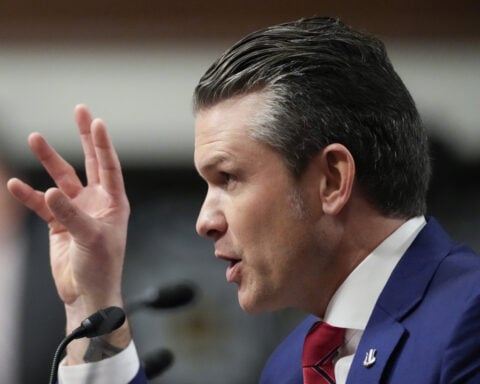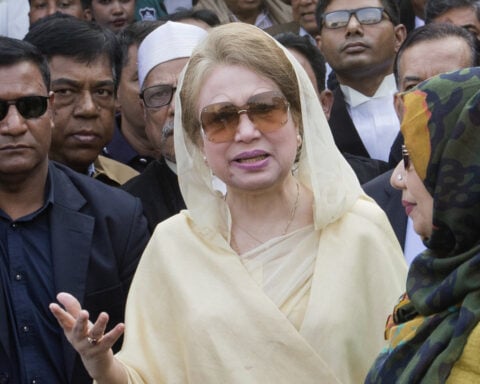By Leika Kihara
TOKYO (Reuters) -Core inflation in Japan's capital accelerated for a third straight month in July but an index gauging demand-driven price growth slowed, data showed on Friday, complicating the central bank's decision on how soon to raise interest rates.
The data comes ahead of the Bank of Japan's two-day policy meeting that ends on Wednesday, when its board will debate whether to raise interest rates and lay out details on how it plans to taper its huge bond purchases.
The Tokyo core consumer price index (CPI), which excludes volatile fresh food costs, rose 2.2% in July from a year earlier, matching a median market forecast and accelerating slightly from a 2.1% gain in June.
The rise in Tokyo CPI, which is considered a leading indicator of nationwide trends, was largely due to a phase-out of government subsidies to curb utility bills.
Inflation as measured by an index that also strips away energy costs, closely watched by the BOJ as a broader price trend indicator, slowed to 1.5% in July from 1.8% in June.
It marked the slowest annual pace in nearly two years, suggesting that price hikes are moderating due to soft consumption.
"The sharp slowdown in inflation excluding fresh food and energy in Tokyo this month reduces the likelihood that the Bank of Japan will raise interest rates next week, though we're sticking to our forecast of a hike in its policy rate to 0.3%," said Marcel Thieliant, head of Asia-Pacific at Capital Economics.
Services inflation slowed to 0.5% in July from 0.9% in June, casting doubt on the central bank's view that rising wages will prod more firms to pass on higher labour costs through price hikes.
"Inflation may look high on the surface due to the boost to import prices from a weak yen. But actual underlying inflation isn't very strong in Japan," said Takahide Kiuchi, an economist at Nomura Research Institute.
"There's no clear evidence that cost-push inflation is being replaced by demand-driven price pressures, as the BOJ argues."
The BOJ ended eight years of negative interest rates and other remnants of its radical monetary stimulus in March as it judged that sustained achievement of its 2% inflation target was now into sight.
The central bank expects rising wages to push up service prices and keep inflation durably around 2%, a condition it set as a prerequisite to further phase out monetary stimulus.
With government fuel subsidies causing one-off swings in the core index, the BOJ looks more closely at the index excluding fuel as a better measurement of the underlying price trend.
BOJ Governor Kazuo Ueda has said the central bank will hike rates from current near-zero levels if it becomes more convinced that underlying inflation stays around 2% in coming years, as it projects.
Many market players expect the BOJ to hike rates this year, though they are divided on whether such a move could come next week or later this year.
(Reporting by Leika Kihara; Editing by Sam Holmes)

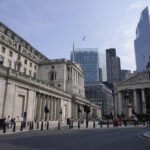 UK inflation unexpectedly eases in December, which could reduce pressure in bond markets
UK inflation unexpectedly eases in December, which could reduce pressure in bond markets
 Body count from South African mine siege rises to 60
Body count from South African mine siege rises to 60
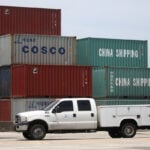 US importers rush in goods from China as Trump tariff threat looms
US importers rush in goods from China as Trump tariff threat looms
 Novak Djokovic breaks a tie with Roger Federer for the most Grand Slam matches in tennis history
Novak Djokovic breaks a tie with Roger Federer for the most Grand Slam matches in tennis history
 China's RedNote: what you need to know about the app TikTok users are flocking to
China's RedNote: what you need to know about the app TikTok users are flocking to
 British author Neil Gaiman denies ever engaging in non-consensual sex as more accusers come forward
British author Neil Gaiman denies ever engaging in non-consensual sex as more accusers come forward
